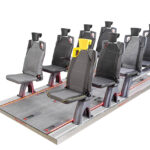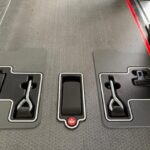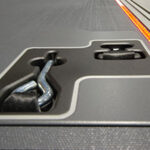Low floor minibuses back on the road
- 29 October 2020
- News
- Posted by Admin
- Leave your thoughts
As a precaution, many local buses were out of order for more than six months, but will soon be back on the road with the necessary adjustments. Tribus is converting hundreds of low floor minibuses with a splash guard and an extra fan and air filter (HEPA) to minimize the risks of contamination from Corona. Soon all fleet owners and public transport companies like Transdev, Arriva, Qbuzz and Keolis van transport their passengers in minibuses safely again.
Industry association OV-NL had commissioned the knowledge institute TNO to conduct research into the effectiveness of ventilation and filters in low floor minibuses. Goal was to determine the spreading risk and the measures needed to reduce the risk of spreading the corona virus equal or below to spreading levels in regular buses. TNO carried out the tests at the Tribus production hall, where a large number of the buses will also be converted.
Passenger simulation in Civitas minibus
Low floor minibuses pose a greater risk in corona time than city and intercity buses when it comes to spreading small suspended virus particles (aerosols) through the air. These can be released when breathing, speaking, sneezing or coughing and are a possible transmission route for a corona infection. Good ventilation reduces the spreading risk. This happens in large buses with the front and rear doors regularly opening at the same time, but this is not an option in minibuses at they have only one door.
To map the spreading of these smaller particles, TNO simulated a passenger infected with corona. This “passenger” – a heated cardboard box – was more than five feet from the driver in the front passenger seat. Subsequently, aerosols were generated for fifteen minutes, which were formed by atomization of oil. This was done in different conditions and different types of minibuses, for example with a single-door or double (metro) door. This way TNO was able to measure the effects of extra air extraction, air supply, air filtration and combinations thereof.

Necessary measures to make low floor minibuses safe again
The research results show that OV-NL did well to err on the side of caution, as chairman Pedro Peters explained earlier. The particle level in the low floor minibus was higher than in a intercity bus without measures. With a combination of air extraction and active filter units, the particle level was around and even below the values of a regular bus.
The earlier TNO research already showed the importance of splash guards, which protect a bus driver against direct transfer of large droplets. The knowledge institute emphasizes the importance of cleaning these screens regularly. “Virus particles in larger droplets can deposit on surfaces and objects (including cough screens) and remain active for some time (hours to days).”
Conversion of Civitas minibuses with HEPA filter and corona screens
A large part of the low floor minibuses in Dutch public transport will be converted at Tribus in the near future. The company has many years of experience in converting minibuses and has the necessary knowledge and experience for this specific conversion. At the recommendation of TNO, at least one roof fan for air extraction is placed in the middle of the passenger compartment. Furthermore, all vans are equipped with corona screens and an active filter unit at the driver’s seat, so that clean air is supplied to the bus driver.
It ultimately differs per region and bus line when the minibuses are included in the timetable again. This requires not only the conversion of the vehicles, but also the availability of drivers. These are usually volunteers who belong to the risk group because of their age. Despite this, many drivers indicate that they would like to get behind the wheel again, in order to provide the rural areas in the country with public transport again.
Want to know more about the Civitas low floor minibus?
Check out the various models of the low floor Civitas minibuses.















